John Walker
Young professional from Montana, USA. I currently work on projects for… Meer over John Walker
How do new and upcoming SMART Glasses and AI-Powered Glasses put pressure on our public values as they enter our educational institutions? This is the research question we posed for a group of Applied Ethics Students to write on this last winter.
Students from the University of Utrecht tackled this question and others through the lens of public values and ethical analysis. Using the Meta Ray-Ban SMART Glasses as their ‘case’ and the augmented reality ‘Orion’ glasses (also Meta made), their report considers both the technical capabilities and what we can do to prepare for such technologies in our educational domains. Their report, Smart Glasses in Higher Education - A Report on Current and Future Ethical Concerns, is a great start to this big topic.
Find this report and other student reports from our Responsible Tech Wiki page: https://servicedesk.surf.nl/wiki/spaces/AIML/pages/195861331/Responsible+Tech+Student+Papers+and+Projects
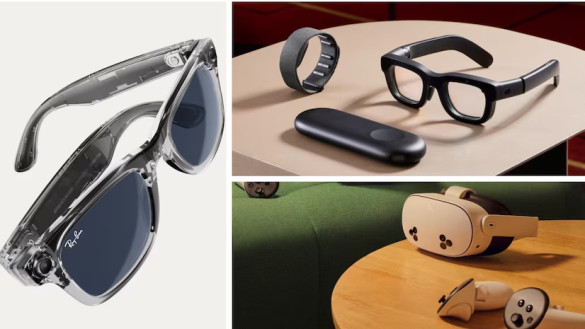
Smart glasses like the Ray-Ban Meta are wearable devices that combine traditional eyewear with advanced technology, featuring built-in cameras (12MP), open-ear speakers, microphones, and touchpad controls that enable users to capture photos/videos, make calls, and interact with AI assistants hands-free - all while looking like regular glasses. Notably, some of these features don’t work in the EU like they do in the US.
Looking ahead, Meta's upcoming Orion glasses promise to take this technology further by incorporating true AR capabilities through tiny temple-mounted projectors and neural interface controls, potentially transforming how we interact with digital information in our field of view.
The evolution of AI-enabled smart glasses, from today's Ray-Ban Meta to tomorrow's Orion, makes it crucial for educational professionals to discuss these technologies now, as they will inevitably enter educational institutions and change how we teach, learn, and interact in academic environments.
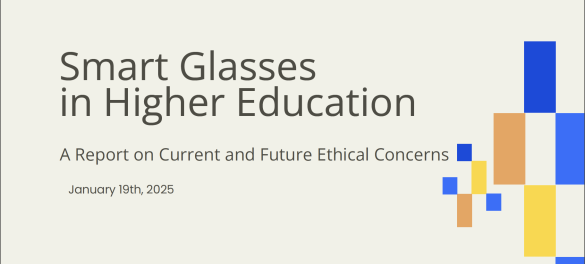
Smart Glasses in Higher Education as a report models the conversation that needs to be had now in a great way with an overview of the concerns the students discuss in more detail throughout the paper.
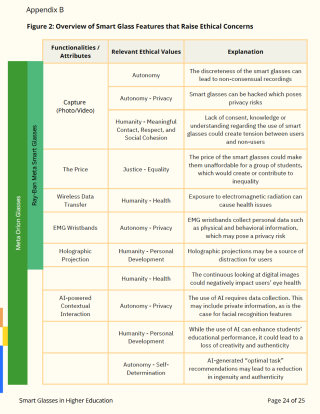
Eye-catching recommendations:
Here are a couple of interesting considerations and recommendations we picked up from the paper that we want to share with you.
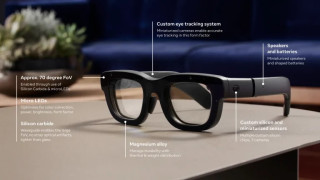
We invite you to click and read through this report, it will inspire you to consider the future of SMART glasses and perhaps the current lenses on your face. From the Responsible Tech project at SURF, we were lucky to have these students write for us! We want to help our members complex these conversations and look ahead towards new technologies. Papers like this do just that!
Find this report and other student reports from our Responsible Tech Wiki page: https://servicedesk.surf.nl/wiki/spaces/AIML/pages/195861331/Responsible+Tech+Student+Papers+and+Projects
References in this blog:
1. Parametric Architecture. (2024, September 27). Meta Orion: Their first true AR glasses. Parametric Architecture. https://parametric-architecture.com/meta-orion-their-first-true-ar-glasses/
2. Business Standard. (2024, September 26). Meta Connect: Orion AR glasses, cheaper Quest 3s headset, and more unveiled. Business Standard. https://www.business-standard.com/technology/tech-news/meta-connect-orion-ar-glasses-cheaper-quest-3s-headset-and-more-unveiled-124092600267_1.html
Young professional from Montana, USA. I currently work on projects for… Meer over John Walker
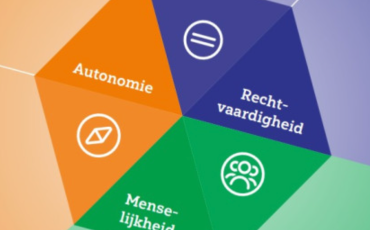


0 Praat mee